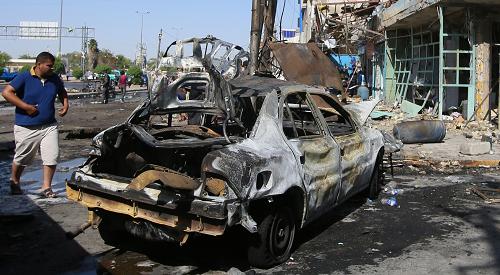Obama's plan to fight IS
- By Zhao Jinglun
 0 Comment(s)
0 Comment(s) Print
Print E-mail China.org.cn, September 13, 2014
E-mail China.org.cn, September 13, 2014
|
|
|
An Iraqi man stands near a destroyed car after a bombing in al-Ghadeer district east of Baghdad on September 12, 2014, that took place during French President Francois Hollande's visit to Iraq. President Francois Hollande said during a visit to Baghdad Friday that France is ready to step up military assistance for Iraq, as global efforts to defeat jihadist fighters intensified. [Xinhua photo] |
An AP report says that weapons captured by IS from Iraq and Syria include kalashnikovs, machine guns, anti-aircraft guns, mortars, 35 tanks, 80 armored police vehicles, hundreds of Humvees and 155 mm howitzers. Most of these are U.S.-made. And Obama believes the solution to the IS problem is to throw even more arms at Syrian rebels and the Iraqi army.
Obama said that the United States has made 150 air strikes against IS, and will continue to "systematically" strike at IS from the air. So U.S. warplanes are actually serving as an air force for the Iraqi and Kurdish fighters. In this way Washington hopes to avoid committing boots on the ground. (Obama emphatically tells the American people that this war is unlike the Afghan or Iraq Wars.) While air strikes may be effective to a certain extent, pin-prick air strikes cannot decide the outcome of the war. And U.S. air strikes regularly kill civilians, a fact that would help IS recruit more fighters.
Even though Obama is not committing boots on the ground, he would send 475 more American troops to shore up friendly forces. That would bring the total U.S. military personnel in Iraq to1,518.
The U.S. president said America will not fight alone. Washington has finally woken up to the problems of Iraq's sectarian government, and has switched its support from Maliki to a new inclusive Iraqi government. Secretary of State John Kerry is traveling to the Middle East to set up support from U.S. allies so Washington can lead a "broad coalition" to fight IS. Some European allies have pledged to provide arms to Kurdish and Iraqi troops. But Jordan, one of Washington's closest allies in the Middle East, is reluctant to play a prominent role. It already hosts a clandestine U.S.-led program to train Syrian rebels.
As for the oil-rich Gulf states, they are well-known bankrollers of jihadist groups. The Wahabi Saudis in particular have been funding like-minded extremist groups for years.
Obama is supposed to have offered a plan for degrading and ultimately destroying IS. But what he has presented looks like a plan for an open-ended war without well-defined conditions for victory.
The author is a columnist with China.org.cn. For more information please visit: http://m.keyanhelp.cn/opinion/zhaojinglun.htm
Opinion articles reflect the views of their authors, not necessarily those of China.org.cn.






